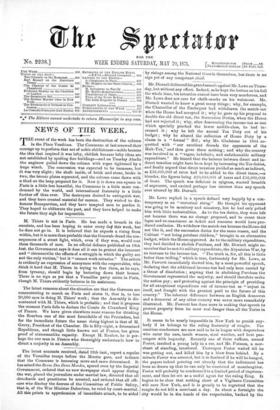Mr. Lowe replied in a speech defined very happily by
a con- temporary as an " oratorical shrug." He thought his opponent was going to be monitory and minatory, but he had only pelted him with little technicalities. As to the tea duties, they were left out because there was no change proposed, and to count their lapse and re-enactment as deficit and resource would have pro- duced confusion. He withdrew the match-tax because the House did not like it, and the succession duties for the same reason, and the Cabinet " not being petulant children," brought in an alternative budget, which the House approved. As to the military expenditure, they had decided to abolish Purchase, and Mr. Disraeli might re- member that he met his military expenditure, the Abyssinian War, by an increase to the income-tax. "The truth is, Sir, all this is little better than trifling," which is true, fortunately for Mr. Lowe, as Mr. Fawcett immediately showed him, by a most powerful speech, declaring that the additional income-tax had only been carried by a threat of dissolution ; arguing that in abolishing Purchase the Government represented the majority, and should therefore make the nation pay ; and protesting against the principle of providing for all exceptional expenditure out of income-tax as " unjust in itself, and fraught with the greatest peril to the future of this country." The inherent difference between an English democrat and a democrat of any other country was never more remarkably illustrated. Mr. Fawcett has done more in making that speech to protect property from its most real danger than all the Tories in the House.


































